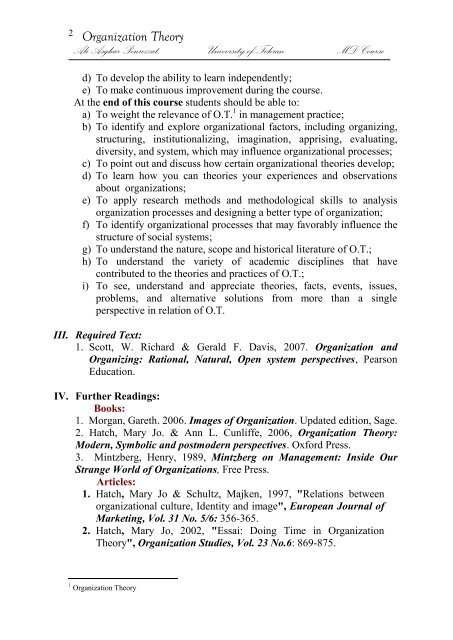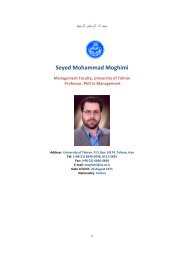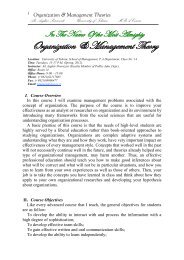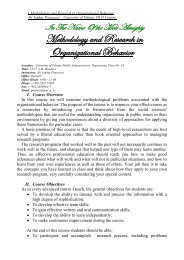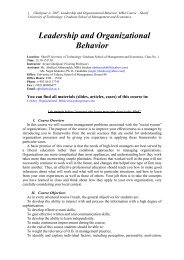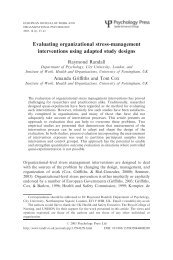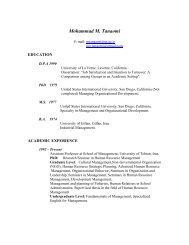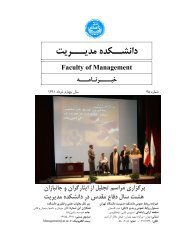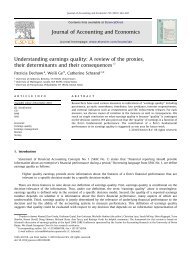Organization Theory Ali Asghar Pourezzat University of Tehran MD ...
Organization Theory Ali Asghar Pourezzat University of Tehran MD ...
Organization Theory Ali Asghar Pourezzat University of Tehran MD ...
You also want an ePaper? Increase the reach of your titles
YUMPU automatically turns print PDFs into web optimized ePapers that Google loves.
2<br />
<strong>Organization</strong> <strong>Theory</strong><br />
<strong>Ali</strong> <strong>Asghar</strong> <strong>Pourezzat</strong> <strong>University</strong> <strong>of</strong> <strong>Tehran</strong> <strong>MD</strong> Course<br />
d) To develop the ability to learn independently;<br />
e) To make continuous improvement during the course.<br />
At the end <strong>of</strong> this course students should be able to:<br />
a) To weight the relevance <strong>of</strong> O.T. 1 in management practice;<br />
b) To identify and explore organizational factors, including organizing,<br />
structuring, institutionalizing, imagination, apprising, evaluating,<br />
diversity, and system, which may influence organizational processes;<br />
c) To point out and discuss how certain organizational theories develop;<br />
d) To learn how you can theories your experiences and observations<br />
about organizations;<br />
e) To apply research methods and methodological skills to analysis<br />
organization processes and designing a better type <strong>of</strong> organization;<br />
f) To identify organizational processes that may favorably influence the<br />
structure <strong>of</strong> social systems;<br />
g) To understand the nature, scope and historical literature <strong>of</strong> O.T.;<br />
h) To understand the variety <strong>of</strong> academic disciplines that have<br />
contributed to the theories and practices <strong>of</strong> O.T.;<br />
i) To see, understand and appreciate theories, facts, events, issues,<br />
problems, and alternative solutions from more than a single<br />
perspective in relation <strong>of</strong> O.T.<br />
III. Required Text:<br />
1. Scott, W. Richard & Gerald F. Davis, 2007. <strong>Organization</strong> and<br />
Organizing: Rational, Natural, Open system perspectives, Pearson<br />
Education.<br />
IV. Further Readings:<br />
Books:<br />
1. Morgan, Gareth. 2006. Images <strong>of</strong> <strong>Organization</strong>. Updated edition, Sage.<br />
2. Hatch, Mary Jo. & Ann L. Cunliffe, 2006, <strong>Organization</strong> <strong>Theory</strong>:<br />
Modern, Symbolic and postmodern perspectives. Oxford Press.<br />
3. Mintzberg, Henry, 1989, Mintzberg on Management: Inside Our<br />
Strange World <strong>of</strong> <strong>Organization</strong>s, Free Press.<br />
Articles:<br />
1. Hatch, Mary Jo & Schultz, Majken, 1997, "Relations between<br />
organizational culture, Identity and image", European Journal <strong>of</strong><br />
Marketing, Vol. 31 No. 5/6: 356-365.<br />
2. Hatch, Mary Jo, 2002, "Essai: Doing Time in <strong>Organization</strong><br />
<strong>Theory</strong>", <strong>Organization</strong> Studies, Vol. 23 No.6: 869-875.<br />
1 <strong>Organization</strong> <strong>Theory</strong>


